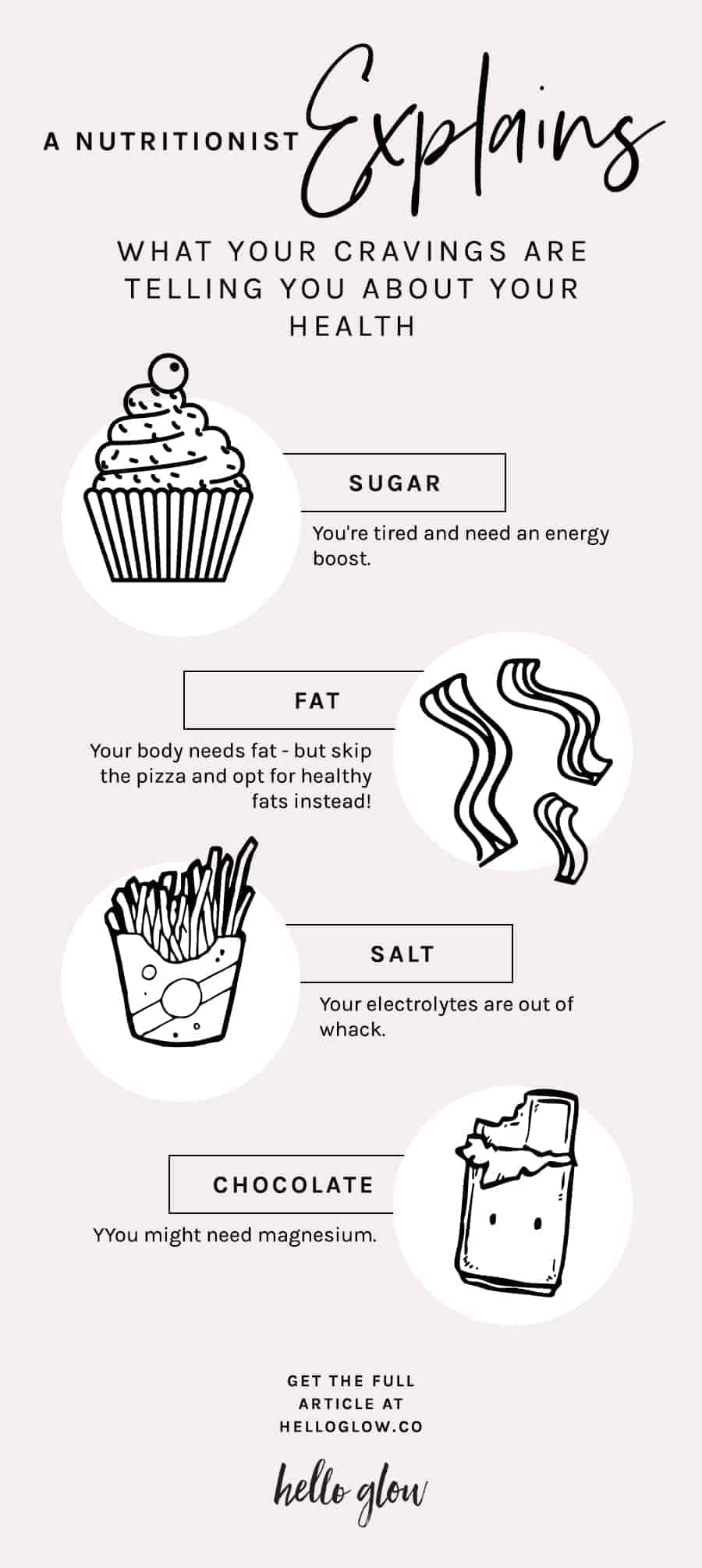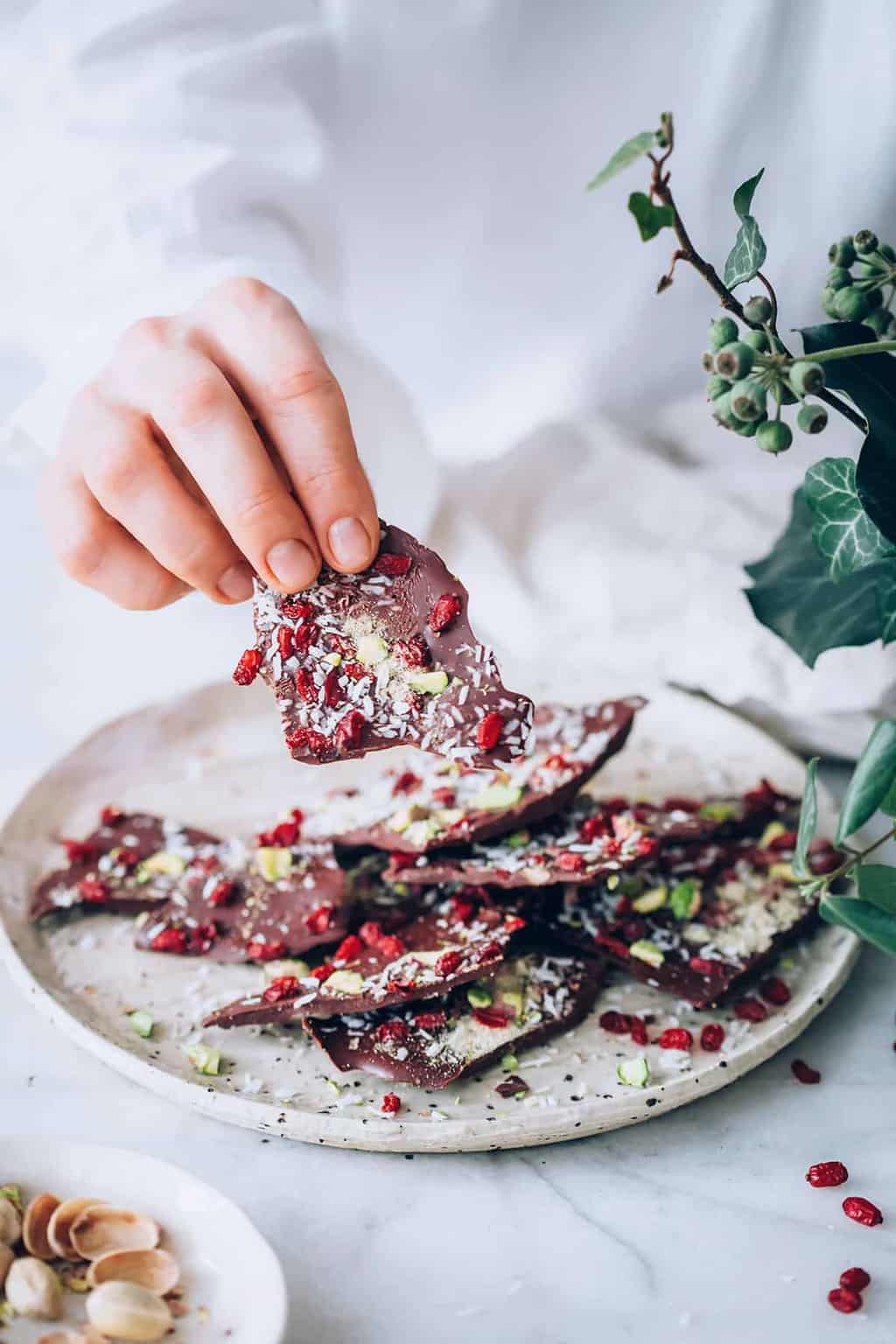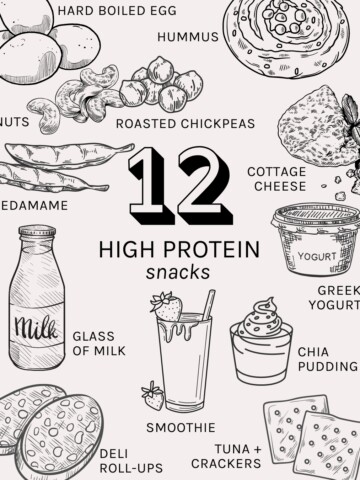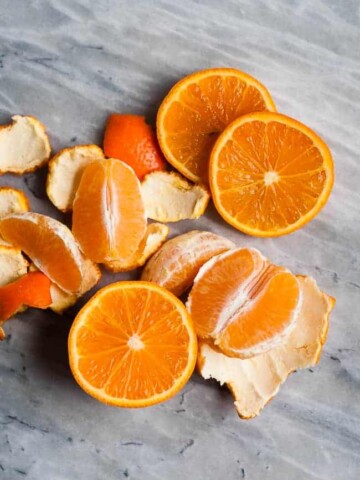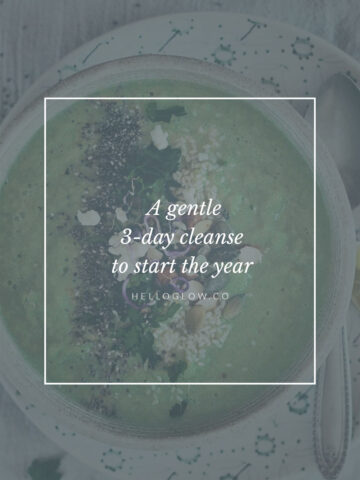One of the most common things I am asked for in my nutrition practice is help with conquering cravings. I’m always of two minds about this because I don’t believe that cravings are always a bad thing—sometimes a craving is our body’s way of asking for something that it’s missing. At the same time, I acknowledge that people often do need some help getting a handle on their cravings.

What Your Cravings Are Telling You
Cravings tend to get a bad rap because the types of foods that people often crave (or believe they crave) usually end up on the naughty list. Think about it, you rarely hear your friend complaining about their out-of-control broccoli cravings, but you’ll hear about cravings for sugary, fatty, or salty foods quite often.
Getting control begins with understanding what your cravings mean. Is it a physical craving or an emotional one? Are you genuinely hungry, or are you bored, anxious, or in a routine?
Change your habits
For instance, if you typically finish a meal with something sweet, ask yourself whether you actually crave sweets or if it’s simply become a habit for you to reach for the chocolates.
If your cravings are habitual, try replacing the ritual with something else. I often advise my clients who find they crave sweets in the evenings to start with a cup of herbal tea and see whether that does the trick.
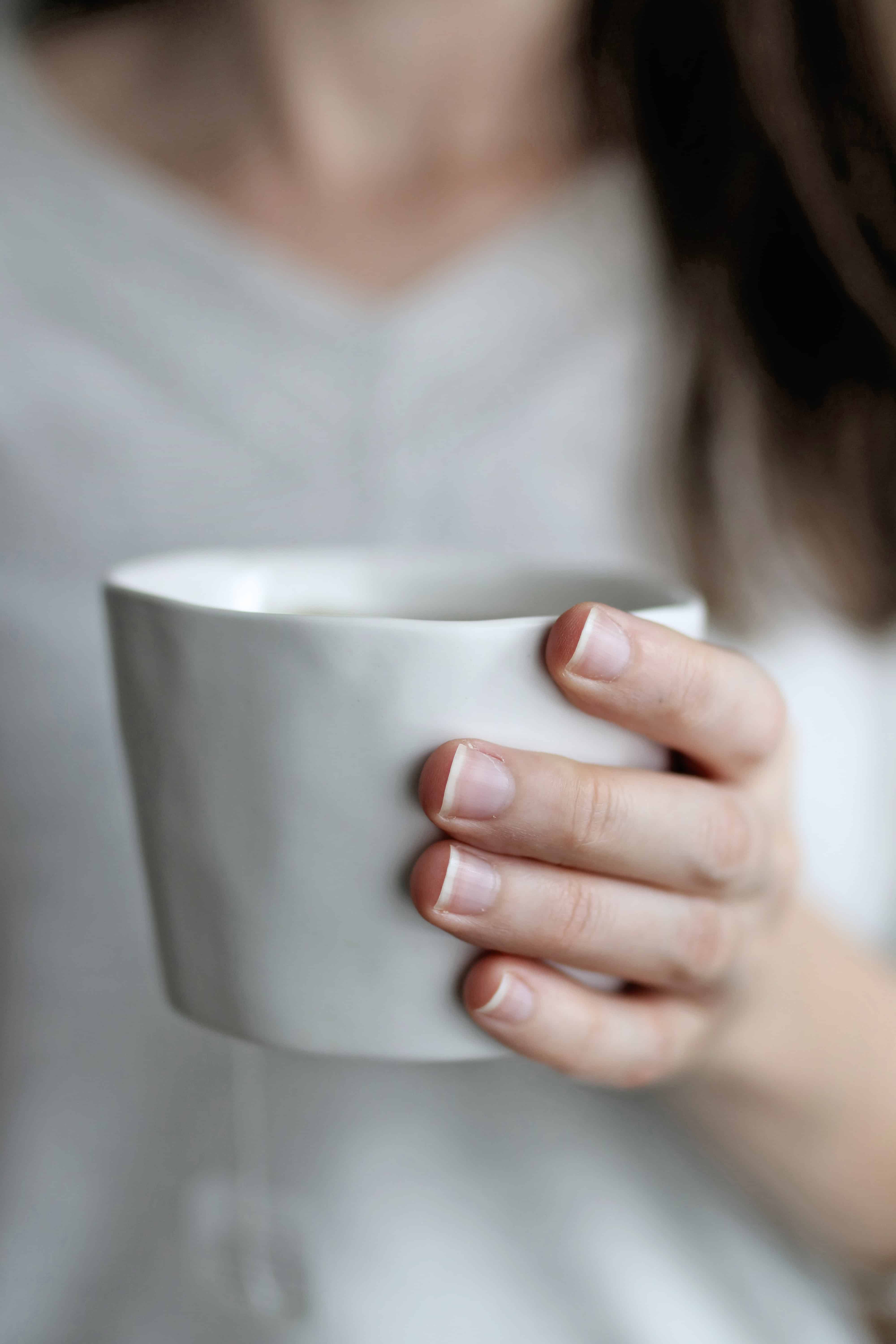
What are you craving?
Also, think about the characteristics of whatever you’re craving. For example, if it’s potato chips, we can determine that they provide salt, fat, and crunch. Will only a potato chip do, or would the crunch of, say, celery topped with a healthy peanut butter fill the same void?
Is your craving emotional?
Consider that often our cravings stem from emotional places. I feel anxious/sad/happy/angry, so I want to eat chocolate/pizza/candy. Or did a television commercial for a highly processed, unhealthy food trigger a craving that I now need to satisfy?
If you can recognize that your craving is coming from an emotional place, is there something you enjoy to replace it? More often than not, going for a short walk, writing in a journal, or calling a friend can distract you from those feelings and fill the void.
Recent evidence reveals that cravings can be associated with signals from fat accumulations in a certain part of the body [source]. And a new area of study is the role that certain bacteria in the gut play in the creation of cravings for different foods [source].
Understanding cravings on the healthy end of the spectrum goes beyond the emotional and habitual sometimes, and to get there, you have to dive into the science behind them. If you’re craving something specific, what is your body asking for?
Sugar Cravings
Sugar is our brain’s preferred fuel and something we’ve been biologically programmed to seek out, so it makes perfect sense that cravings are often driven by sugar [source]. Unfortunately, our biology hasn’t caught up with the fact that there’s sugar available in abundance these days, so cravings for sweet things deserve an extra level of thoughtfulness.
A craving for sugar can be related to fatigue and your body’s way of looking for fast fuel to keep going. Another thing to consider is whether you might be coming down off a sugar “high” because the last thing you want to do is repeat that even though your cravings may skyrocket at that time.
Sugar can be very habit forming, with a reward pathway that reinforces further cravings [source]. It is known that a sugar-rich diet alters serotonin levels in times of stress, probably helping with anxiety [source].
Recent animal studies revealed that a change in environment, including more space and enrichment such as improved bedding, sheltered space, and less isolation, reduced sugar-seeking behaviors [source]. So, to extrapolate that to humans, it may be that environmental factors contribute in some way to our sugar cravings.
Once you are accustomed to a sweet taste, it can be jarring to replace those foods with those that are less sweet. The good news is that taste buds do change, and you can work your way out of it by reducing the sugary stuff bit by bit. After a while, you’ll be surprised at how sickly sweet some things taste when you used to think they were fine.
If you’re craving sweets, try to stick with things like fruit that come packaged naturally with dietary fiber, nutrients, and minerals. I also like to pair sweet things with some protein and healthy fats, like a handful of nuts, which help your blood sugar remain stable and, in turn, helps keep those cravings under control.
Fat Cravings
Cravings for greasy, fatty foods often signal that you’re in need of some fat. Seems pretty straightforward, no? Our bodies depend on essential fatty acids for many vital functions, and we need fat in order to absorb the fat-soluble vitamins A, D, E, and K.
If you find yourself with an unscratchable itch for fatty foods, try replacing the standard junk foods and low-quality refined fats with healthy fats, such as those found in avocados, nuts, olives, chia/hemp/flax seeds, coconut oil, and MCT oil.
Don’t get me wrong, if you’re craving a pizza, there are times that only a pizza will do, but it warrants asking yourself whether avocado toast drizzled with olive oil would suffice now and then. Or perhaps starting your day with an MCT oil latte might help reduce your cravings for greasy foods later in the day.
Also consider that often fatty foods offer needed nutrients, such as high-quality dairy for calcium and B12, and fatty fish (like salmon or mackerel) contains omega-3 fatty acids, which may be exactly what your body is asking for.
Salt Cravings
Much like sugar, salt can become a bit of an acquired taste that you need to work your way out of. But in certain situations, cravings for salt can also indicate a need for minerals and electrolytes that you’ve lost due to activity.
My husband is an elite-level endurance athlete whose salt needs are higher than usual on a regular basis, but particularly during a race. He actually chews salt tablets along the way, and he says he can tell his electrolytes are back in balance when the tablets start tasting gross. But when he needs salt, they taste great!
But statistics show that most people on a Western diet (who aren't running marathons) are overloaded with salt because of the high amounts contained in processed foods (e.g., salad dressing, tomato sauce, all canned and packaged foods) to make them taste good even though they may sit on the shelf.
The average daily salt intake is up around 10 g, which is more than twice the recommended 4 g per day [source]. So it’s difficult to become depleted, and probably there’s another reason for cravings.
A craving for salt can also be a sign that you’re dehydrated, as sodium helps your body to hang on to fluids. It’s no coincidence that pregnant women often crave salty foods since their hydration needs go up, and so does their need for the minerals that are often found in salt.
Chocolate Cravings
Chocolate deserves a special mention here since it’s one of the most craved foods we hear about, and it’s got a unique package of sweetness, fat from the cocoa butter, and (when we’re talking about the good quality stuff) it’s also rich in antioxidants and minerals [source].
Cocoa contains magnesium, and since magnesium is thought to help relax muscles, perhaps it’s no coincidence that cravings for chocolate tend to go up when women are menstruating.
If you’re craving chocolate, treat yourself to a square or two of the good stuff—as dark as you can stand it—and see if that does the trick. You can also try making chocolate avocado pudding, which combines the healthy fats from avocados with minerals from the cocoa powder and a touch of maple syrup for sweetness.
Dealing with unhealthy cravings
Once you take a good look at a particular craving, observe when it happens, and consider exactly what is in the food you are pining away for, you will know if it’s based on health or habit.
Research has shown that a rethinking of the framework used to make food choices can have an impact on cravings. Participants were given information about the nutrients in certain foods, and researchers noted a change in their unhealthy cravings. Not only did participants make healthier food choices, but they also reduced their calorie intake and even developed cravings for healthy, nutritious food [source].
This article was medically reviewed by Dr. Gina Jansheski, a licensed, board-certified physician who has been practicing for more than 20 years. Learn more about Hello Glow's medical reviewers here. As always, this is not personal medical advice and we recommend that you talk with your doctor.
Frequently Asked Questions
What are food cravings?
Food cravings are intense desires for specific types of food, often characterized by a strong urge or need to eat that food immediately. Yes, food cravings are a common experience for many people, and they can be caused by a variety of factors.
What causes food cravings?
Food cravings can be caused by a variety of factors, including emotional stress, hormonal changes, nutrient deficiencies, and unhealthy eating habits. Food cravings can sometimes indicate that your body is lacking certain nutrients. For example, a craving for chocolate may mean your body needs magnesium, while a craving for dark leafy greens may indicate a need for iron or folate. Craving salty foods may be a sign of dehydration or a lack of minerals like potassium and magnesium in your diet. It may also be due to stress or emotional eating habits. Sugar cravings can be caused by a variety of factors, including stress, hormonal changes, and a lack of healthy fats in your diet. They may also indicate an addiction to sugar or a need for quick energy. Craving carbs may be a sign of low blood sugar or an insufficient intake of complex carbohydrates in your diet. It may also be a result of emotional eating habits. The food cravings chart is a tool that can help you identify what your food cravings may mean in terms of nutrient deficiencies or emotional needs.
How can I satisfy my food cravings in a healthy way?
You can satisfy your food cravings in a healthy way by choosing nutritious foods that are similar in taste or texture to the food you are craving. For example, if you are craving salty potato chips, you could try roasted nuts or crunchy veggies with hummus instead. Some foods that can help reduce food cravings include high-protein foods, fiber-rich foods, and healthy fats. Examples include lean meats, beans and legumes, whole grains, avocados, nuts and seeds, and dark chocolate. Drinking water can help reduce food cravings by keeping you hydrated and reducing the intensity of hunger pangs.
How can I tell the difference between physical hunger and food cravings?
Physical hunger is a sensation in your body that is felt in the stomach and may be accompanied by symptoms like weakness or lightheadedness. Food cravings, on the other hand, are often sudden and intense desires for a specific type of food. You may also be an emotional eater. Emotional eating is a term used to describe the habit of using food to cope with emotional stress or to satisfy emotional needs, rather than to fulfill physical hunger.
Can food cravings be a sign of a medical condition?
In some cases, food cravings can be a sign of a medical condition like diabetes or hypoglycemia. If you are experiencing frequent or intense food cravings, it may be worth speaking to a healthcare professional. Craving unhealthy foods may be due to a variety of factors, including emotional stress, a lack of nutrients in your diet, or an addiction to certain types of foods
124
